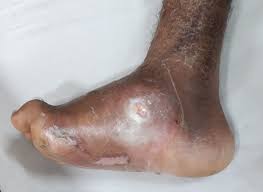Complications That May Arise in Untreated Diabetic Foot Wounds
April 22 2025
Diabetic foot wounds can escalate quickly, leading to serious complications like infections, ulcers, and even amputations . Learn how early intervention and proper care can make all the difference! 👉
#DiabetesCare #FootHealth #FFLC
Dr. Drew Chapman, DPM, FACFAS
Kevin Lam, DPM, FACFAS
Diabetic foot wounds are among the most serious and challenging complications faced by individuals living with diabetes. As a podiatrist, I have seen firsthand how a seemingly minor wound can escalate into a severe medical crisis if not managed properly. The presence of diabetes impairs the body’s natural healing process, making foot wounds particularly susceptible to complications. Understanding these potential risks can help patients and healthcare providers take the necessary steps to prevent devastating outcomes.
Diabetic foot wounds can escalate quickly, leading to serious complications like infections, ulcers, and even amputations.
INFECTIONS
One of the primary complications associated with diabetic foot wounds is infection. Diabetes weakens the immune system, reducing the body’s ability to fight off bacterial invaders. Even a small cut or blister can become a gateway for bacteria, leading to cellulitis, abscess formation, or even osteomyelitis, a severe infection of the bone. If left untreated, infections can spread rapidly, requiring aggressive antibiotic treatment or, in extreme cases, surgical intervention. Patients with poor circulation, often caused by peripheral arterial diseases (PAD), are particularly vulnerable, as reduced blood flow limits the delivery of oxygen and essential nutrients needed to combat infection.
NEUROPATHY
Another serious complication is the development of non-healing ulcers. Diabetic neuropathy, a common condition in long-term diabetes patients, diminishes sensation in the feet. Without the ability to feel pain or pressure, a patient may not even realize they have a wound until it has worsened. When combined with poor circulation, these ulcers can persist for months, increasing the risk of infection and further tissue damage. In severe cases, ulcers may extend deep into the tissue, exposing tendons and bones, significantly raising the likelihood of amputation.
condition in long-term diabetes patients, diminishes sensation in the feet. Without the ability to feel pain or pressure, a patient may not even realize they have a wound until it has worsened. When combined with poor circulation, these ulcers can persist for months, increasing the risk of infection and further tissue damage. In severe cases, ulcers may extend deep into the tissue, exposing tendons and bones, significantly raising the likelihood of amputation.
GANGRENE
Gangrene is another potential consequence of untreated diabetic foot wounds. When a wound becomes severely infected and blood flow is compromised, tissues begin to die. Gangrene is often irreversible and may necessitate surgical debridement or, in extreme cases, amputation of the affected area. The emotional and physical toll of losing a limb is profound, affecting mobility, independence, and overall quality of life. Early intervention is critical to prevent wounds from reaching this stage.
SEPSIS
Beyond the immediate physical dangers, diabetic foot wounds can lead to systemic complications. Sepsis, a life-threatening response to infection, occurs when bacteria from an infected wound enter the bloodstream. This condition can cause widespread inflammation, leading to organ failure and, if not treated promptly, death. The mortality rate for patients with diabetes who develop severe sepsis is alarmingly high, underscoring the importance of early and aggressive wound care.
CHARCOT FOOT
One of the lesser-discussed complications is the risk of Charcot foot, a condition that can develop in  diabetic patients with neuropathy. Repeated trauma to the foot, often from walking on an undetected wound or ulcer, can lead to fractures and joint dislocations. Over time, the foot may become deformed, making wound healing even more difficult and increasing the likelihood of further complications. Proper offloading techniques, such as wearing specialized footwear or using assistive devices, are essential to preventing this destructive cycle.
diabetic patients with neuropathy. Repeated trauma to the foot, often from walking on an undetected wound or ulcer, can lead to fractures and joint dislocations. Over time, the foot may become deformed, making wound healing even more difficult and increasing the likelihood of further complications. Proper offloading techniques, such as wearing specialized footwear or using assistive devices, are essential to preventing this destructive cycle.
Chronic wounds also have a significant impact on a patient’s overall health and well-being. Persistent wounds can lead to prolonged hospital stays, repeated surgical interventions, and a diminished quality of life. Patients may experience chronic pain, mobility restrictions, and emotional distress, often leading to depression or anxiety. The financial burden of ongoing treatment, including wound care supplies, medications, and frequent doctor visits, can also be substantial.
INTERVENTIONS
The key to managing diabetic foot wounds and avoiding these complications is a proactive approach. Regular foot examinations, both by healthcare professionals and patients themselves, are crucial in identifying wounds early. Patients must be educated on proper foot hygiene, appropriate footwear, and the importance of seeking medical attention at the first sign of a problem. Advanced treatment options, including wound debridement, specialized dressings, hyperbaric oxygen therapy, and skin grafting, have significantly improved outcomes for patients with diabetic foot wounds. However, these interventions are most effective when utilized early in the wound-care process.
Collaboration between podiatrists, endocrinologists, vascular specialists, and wound care experts is vital in managing diabetic foot wounds. A multidisciplinary approach ensures that all aspects of the patient’s health are considered, from glycemic control to circulation management. Encouraging lifestyle modifications, such as smoking cessation, weight management, and regular exercise, also plays a crucial role in promoting overall foot health and preventing complications.
Diabetic foot wounds are not merely a podiatric concern; they are a critical health issue with far-reaching implications. The devastating complications associated with poor wound management emphasize the need for vigilance, early intervention, and comprehensive care. As podiatrists, our role extends beyond treating wounds – we must educate, advocate, and support our patients in maintaining optimal foot health to prevent these life-altering consequences. By prioritizing prevention and proactive treatment, we can help individuals with diabetes avoid the serious complications that threaten their mobility and overall well-being.
If you are experiencing difficult to heal wounds, please contact Dr. Chapman’s office at (239) 430-3668 (FOOT) or visit www. NaplesPodiatrist.com to schedule an examination.

 Fax: (239) 692-9436
Fax: (239) 692-9436 Tel: 239-430-3668
Tel: 239-430-3668